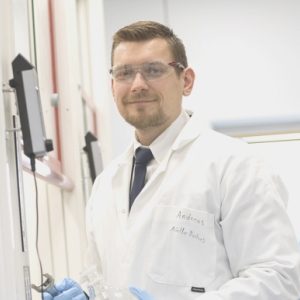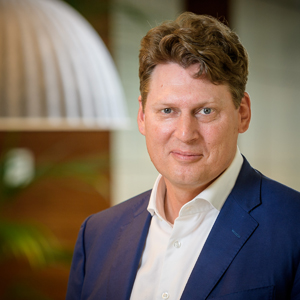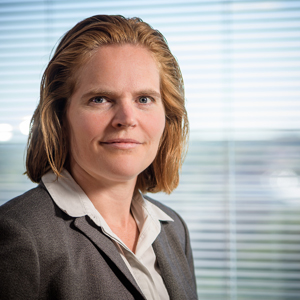
It was less than a year ago when, brimming with enthusiasm, he opted for the uncertainty of a start-up. Chemist Andreas A. Bastian started his business AGILeBiotics on the Zernike campus of the University of Groningen. His aim is to achieve a breakthrough in the fight against antibiotic resistance: ‘We have since developed a technology that is protected by a patent both in Europe and in the USA, and that is crucial.’
By 2050, ten million people are expected to die every year as a result of infections involving resistant bacteria. Antibiotic resistance is an immense global health problem. The momentum of interest therefore makes it the ideal time for Bastian’s new company AGILeBiotics to attract investors: ‘I am extremely busy pitching our business idea to all kinds of parties. We have already received the first lot of funding. Back in February, three local investors came on board and with their help we financed the launch of our research.’ The scientist realises that major financial interests are at stake: ‘The profit potential of our invention is enormous. My team, our investors and I believe in the idea, and we willing to accept the risk of a start-up. We currently have five staff members, who all have a scientific background and some of them have experience in the business sector. We have the perfect environment here with small innovative businesses that seek out one another, support and help one another.’
Significant cost savings
The patented technology is called OxaSelect, and was developed by Bastian during his doctoral programme in Groningen. The major selling point is that this technology makes it possible to develop new antibiotics based on old ones more easily and more quickly. ‘We are able to reduce the number of synthesis steps by 50%. That makes a significant difference in terms of production costs and accessibility of new antibiotics. This method also provides a greater chance of success, because this type of antibiotics has been successfully used since the 1940s, and that was before resistance developed. I expect that we will be able to conduct the first tests on mice using a candidate antibiotic in the next few years.’
The next investment round
Capital is crucial for any start-up at this stage. The patent has been granted, but a market launch is still a long way off. ‘I adopt a long-term approach as far as our business is concerned,’ says Bastian, ‘but of course I do have to act in the short term, and so right now, I need to attract as much investment as possible. It is all rather uncertain, but it energises me, and that is the challenge. There have been only very few developments in this field over the past decades. If we have a successful substance soon, we will also have sufficient income and opportunities to attract more investors. We also need innovative start-ups more than ever. We have only made very little progress in the field of antibiotics over the last few decades, while there is an urgent need for new antibiotics in order to keep pace with ever-increasing levels of bacterial resistance.’
Communication is key
‘Communication is key for us,’ explains Bastian. ‘Only then do we attract the attention of relevant market parties, and they know what we are able to do.’ For example, he gave a speech in early November at the annual BIO-Europe event in Berlin, the world’s largest event for the biotech industry. ‘We also gained a great deal of positive responses there. There is confidence in our idea,’ concludes Bastian, who obtained his doctorate under the supervision of Professor Andreas Herrmann, a co-founder of the company.

